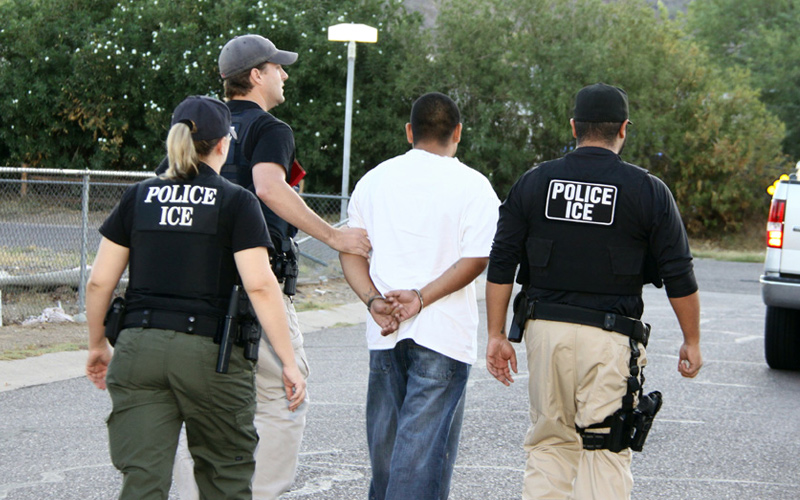A recent letter sent by major nonprofit organization to the USCIS commented on the Notice of Intent filed by the USCIS (U.S. Citizenship and Immigration Service) to implement stateside processing of a provisional waiver of inadmissibility for certain immediate relative. This would be a major administrative change in its procedures for processing thousands of cases where a U.S. citizen applies for legal residence for an undocumented spouse. Under current law an undocumented spouse that entered illegally or remained past the visa date (unless an immediate relative) may not apply for adjustment of status and become lawful permanent resident unless they return to the their home country and reenters properly. The big drawback with this scenario occurs when the undocumented resident remained in the U.S. illegally for any period greater than six months. In such a case, they are subject to the 3/10-year bar to re-entry.
The letter, was formulated by a host of respected nonprofit Organizations (listed below), and asks that the Service take the following initial comments into consideration as it works toward a draft proposed rule.
1. Expand the Rule to Permit Preference Relatives to Apply for Provisional Waivers
USCIS states that the provisional waiver process “reflects the Administration’s strong commitment to efficiency in the administration of immigration law and the facilitation of legal immigration” by “encourag[ing] individuals who may be eligible for a waiver of inadmissibility to seek lawful readmission to the United States ....”1 In addition, it is expected that rule change “would provide a more predictable and transparent process andimproved processing times ... [and] would streamline the process for both USCIS and the Department of State.”2
As currently formulated, the provisional waiver process would only apply to a very limited group of applicants, namely, immediate relatives of U.S. citizens who can show extreme hardship to a U.S. citizen spouse or parent. As a practical matter, the process would be limited to:
- Spouses of U.S. citizens who can show extreme hardship to their spouses or to a U.S. citizen parent;
- Parents of adult U.S. citizens who can show extreme hardship to a U.S. citizen parent or U.S. citizen spouse; and
- Unmarried children (under 21) of U.S. citizens who can show extreme hardship to their U.S. citizen parent. Since children under 18 cannot accrue unlawful presence, this category would be limited to children between the ages of 18 and 21.
A better path would be to open the provisional process to preference categories, including unmarried adult children of U.S. citizens, and spouses and children of lawful permanent residents (LPRs). The hardships suffered by these preference category families, who face the same lengthy separation from loved ones when they seek LPR status, are as compelling as those suffered by immediate relatives. Opening up the provisional waiver process to preference relatives would offer more measurable benefits to USCIS and DOS, would better facilitate legal immigration by encouraging a more sizable group to come out of the shadows, and comports with USCIS’s stated goal to alleviate unnecessary familial hardships.
In its FAQs, USCIS notes that part of its justification for limiting the provisional waiver process to immediate relatives is that immediate relatives are not subject to the numerical limitations on visas, and therefore, visas are always available to this group.3 However, if preference relatives are permitted to apply for a provisional waiver only when their priority date is current and an immigrant visa is available, we see no discernable difference for limiting the process to immediate relatives.
2. Expand the Rule to Permit Lawful Permanent Residents to Serve as Qualifying Relatives for Hardship Purposes
INA §212(a)(9)(B)(v), which sets forth the statutory basis for the unlawful presence waiver, permits a waiver for those who can show hardship to a U.S. citizen or an LPR spouse or parent. However, USCIS has indicated its intent to exclude immediate relatives who can show hardship to an LPR spouse or parent under the new process. The principles of family unity and benefits of reduced hardships apply with equal force to LPRs as they do to U.S. citizens. Such a policy will limit even further the individuals who can benefit from the new process, without any rational reason for doing so. Therefore, USCIS should open the provisional waiver process to those who can demonstrate extreme hardship to an LPR spouse or parent.
3. Expand the Rule to Permit Provisional Processing of Other Waivers
USCIS states that the process change will be limited to individuals whose only ground of inadmissibility is unlawful presence. As a result many people with compelling equities who could obtain lawful status will be unable to benefit from the new process simply because they are subject to an additional, waivable ground of inadmissibility. USCIS should consider opening up the provisional process to other waivers that require extreme hardship since such waivers could easily be adjudicated at the same time. For example, INA §212(h)(1)(B), which waives certain criminal grounds of inadmissibility, uses the extreme hardship standard. Similarly, INA §212(i), which waives inadmissibility for fraud or misrepresentation, uses the exact same language as the unlawful presence waiver.
Under sound policies adopted by USCIS in 2009 guiding the adjudication of I-212 and I-601 waivers, USCIS stated that an I-212 waiver of a prior removal order may be approved if the agency has already granted an unlawful presence waiver (or other inadmissibility waiver), “since approval of the Form I- 212 involves the exercise of discretion and, by deciding to approve the Form I-601, the adjudicator has determined that the alien merits a favorable exercise of discretion.”4 This same logic can be applied here. If USCIS finds that an applicant has established extreme hardship to a family member for the purposes of one waiver, it should find the same for a second.
USCIS should also consider opening up the process to waivers that do not require extreme hardship, such as waivers under INA §212(h)(1)(A) and §212(d)(11). The current Form I-601 is designed to accommodate multiple waiver requests and it would take few additional resources to adjudicate multiple waivers through this process. Moreover, broadening the process to include additional grounds of inadmissibility would further USCIS’s goals of increasing efficiency in the administration of immigration law and facilitating legal immigration.
4. Permit Provisional Waivers for Individuals at Different Stages of the Immigrant Visa Process
The notice of intent states that “[a]n alien would be able to obtain [a provisional] waiver only if a Petition for Alien Relative, Form I-130, is filed by a U.S. citizen on his or her behalf and that petition has been approved....”5 In addition, in its FAQs, USCIS states that the proposed waiver process “would only affect individuals who have not yet filed a Form I-601 and who will file a waiver request after a final rule is published.”6 In drafting the final rule, we ask USCIS to include language clarifying that individuals at various stages of the immigrant visa process may benefit from the provisional waiver rule. Applicants should be permitted to file for a provisional waiver concurrently with the I-130, Petition for Alien Relative, or separately if the I-130 has already been approved. In addition, the provisional waiver process should be available to individuals whose cases are pending at the National Visa Center, and to individuals whose cases have been transferred to the consulate, but who have not yet departed the U.S. for their visa interview at the time the final rule is implemented. Individuals who have an interview date scheduled, but who have not yet departed the U.S., should be permitted to reschedule their interviews in order to apply for a provisional waiver.
5. Permit Concurrent Filing of I-212 Permission to Reapply for Admission after Deportation or Removal
Aliens who are inadmissible due to a prior removal order may file Form I-212 to obtain permission to reapply for admission. Applicants who are in the United States seeking adjustment of status, or who are seeking advance permission to reapply before departing the U.S. to consular process can submit Form I-212 with USCIS for stateside adjudication. As noted above, it is USCIS policy to grant an I-212 waiver if the agency has already granted an I-601 waiver.7 Therefore, individuals who require an unlawful presence waiver and permission to reapply following removal should be permitted to file Forms I-212 and I-601 through the stateside process concurrently.8 To conclude otherwise would require the applicant to first file the I-212 and obtain permission to reapply, and then separately file a provisional unlawful presence waiver. Consecutive, rather than concurrent adjudication would be a waste of USCIS time and resources.
6. Issue Notice of Intent to Deny (NOID) When an Additional Ground of Inadmissibility Is Suspected
The notice of intent states that “USCIS would deny the application for a provisional waiver if other possible grounds of inadmissibility are found or arise during adjudication.”9 Whether a person is subject to one or more grounds of inadmissibility is not a black or white determination. In many cases, it may be impossible for the Service to determine whether a particular ground of inadmissibility applies without first obtaining additional information from the applicant. If an additional ground of inadmissibility is suspected, we propose that USCIS issue a NOID, rather than an immediate denial. This would provide individuals with the opportunity to demonstrate, if applicable, that they are not subject to the inadmissibility ground alleged, and remain eligible for the provisional waiver process. Issuing a NOID would ensure that all persons who are eligible for a provisional waiver are able to benefit from the process and would decrease the number of decisions that are appealed to the already overburdened Administrative Appeals Office.
7. Provisional Waivers Should Not be Readjudicated and a Presumption of Extreme Hardship Should Apply to the Adjudication of Additional Waivers
According to the announcement, if the provisional waiver is approved, the applicant would proceed abroad for a formal interview with a U.S. consular officer. If no grounds of inadmissibility other than unlawful presence arise, “the provisional waiver ... would facilitate immigrant visa issuance.”10 The rule should make it clear that, absent disclosure of negative factors during the consular interview, USCIS’s decision to approve a provisional waiver is to be honored by DOS.
According to the announcement, if a consular officer makes a determination that the applicant is subject to another ground of inadmissibility that can be waived, the applicant will be instructed to file another waiver application with USCIS. USCIS should not readjudicate the previously approved provisional unlawful presence waiver and officers should not require applicants to submit additional documentation to supplement the previously-approved waiver. In addition, the approval of a provisional unlawful presence waiver should give rise to a presumption of extreme hardship, which should be applied to the adjudication of waivers of additional grounds of inadmissibility with the same standard.
8. Clarify Provisions Relating to Individuals in Removal Proceedings
The proposed regulations should clarify that respondents in removal proceedings may benefit from the provisional waiver process. Currently, the notice of intent states that “aliens with waiver applications under section 212(a)(9)(B)(v) of the Act currently pending in either administrative or judicial proceedings would not qualify for this new process.”11 However, there are many individuals in removal proceedings without a pending waiver who should be deemed eligible. These include individuals whose cases have been administratively closed as part of the Administration’s current prosecutorial discretion initiative or because they were granted temporary protected status while in proceedings. If these otherwise eligible individuals are not permitted to benefit from the provisional waiver process, they will remain in limbo on the immigration court docket, instead of taking steps to obtain lawful permanent residence. To prevent this, individuals in removal proceedings should be permitted to apply for a provisional waiver while their proceedings are pending. If the waiver is granted, proceedings would be terminated, and the individual would depart the United States for consular processing.
Similarly, provisional waiver applications filed by individuals who are placed in removal proceedings while the application is pending should continue to be processed and adjudicated by USCIS. In the alternative, Immigration and Customs Enforcement (ICE) should adopt a policy of refraining from filing a notice to appear for individuals with a pending waiver until USCIS has rendered a final decision (including appeal) on the application.
9. Continue Widespread Public Outreach to Prevent the Unauthorized Practice of Law by Notarios and Unscrupulous Practitioners
The February 22, 2012 alert USCIS placed on its website and circulated by e-mail, reminding the public that the provisional waiver process will not take effect until a final rule is published in the Federal Register, was both necessary and welcome. As expected, the January 6 announcement generated a significant amount of interest from the press and the public. Although the announcement clarified that no process changes would be implemented until a final rule is promulgated, the message was slow to trickle down to the stakeholder community, and notarios pounced. Soon after the announcement was made, we began receiving numerous reports from around the country of television, print, and radio advertisements by notarios soliciting business for the “new waiver.” We also received reports that well-intended individuals, such as members of the clergy, were telling people to “go to immigration and apply for the waiver.”
Given the continuing public interest in this topic, we strongly urge USCIS to keep this alert prominently displayed on the site’s home page (in English and Spanish) until the effective date of the final rule. We also urge USCIS to continue its outreach efforts by taking additional steps to warn the public to not be taken in by the fraudulent claims and promises of notarios.
We appreciate the opportunity to comment on this notice of intent and look forward to a continuing dialogue with USCIS on issues concerning this important matter. If you have any questions, please contact Robert Deasy, AILA Director, Liaison and Information, rdeasy@aila.org, or Betsy Lawrence, AILA Associate Director, Liaison & Information, blawrence@aila.org.
Sincerely,
American Dream Community Agency
Americans for Immigrant Justice, formerly Florida Immigrant Advocacy Center American Immigration Council
American Immigration Lawyers Association
Asian American Justice Center, member of the Asian American Center for Advancing Justice
Asian Law Alliance
Asian Pacific American Legal Center ASISTA
Campaign for Community Change (CCC) CARECEN San Francisco
Capital Area Immigrants’ Rights Coalition
AILA InfoNet Doc. No. 12022746. (Posted 02/27/12)
USCIS Notice of Intent to Implement Provisional I-601 Processing
February 24, 2012
Page 7 of 7
Catholic Charities Archdiocese of San Antonio, Immigration Services Church World Service, Immigration and Refugee Program
Coalition for Humane Immigrant Rights of Los Angeles (CHIRLA) Colombianos en Accion
Community to Community Development – C2C Dolores Street Community Services
Fair Immigration Reform Movement (FIRM) FANM/Haitian Women of Miami
Friends Committee on National Legislation Immigration Equality
JOB (Justice Overcoming Boundaries) SD/South County Immigration Task Force Korean American Resource & Cultural Center (KRCC), Chicago
Korean Resource Center (KRC), Los Angeles La Cocina
La Raza Community Resource Center Lutheran Immigration and Refugee Service National Council of La Raza (NCLR) National Immigrant Justice Center (NIJC) National Immigration Forum
National Immigration Law Center
National Korean American Service & Education Consortium (NAKASEC) National Latina Institute for Reproductive Health
New York Immigration Coalition
New York State Bar Association, Commercial & Federal Litigation Section, Immigration Litigation Committee
NETWORK, A National Catholic Social Justice Lobby Reformed Church of Highland Park’s Immigration Committee Service Employees International Union (SEIU)
SEIU - United Service Workers West
Services, Immigrant Rights & Education Network (SIREN) Women’s Refugee Commission
World Relief
cc: Cecilia Munoz, Director, White House Domestic Policy Council Felicia Escobar, Senior Advisor for Immigration Policy, White House
Domestic Policy Council
Julie Rodriguez, Associate Director of Public Engagement, White House Esther Olavarria, Counsel to the Secretary, DHS
Kelly Ryan, Acting Deputy Assistant Secretary for Policy, DHS
1 “USCIS to Propose Changing the Process for Certain Waivers,” also reprinted on AILA InfoNet at Doc. No. 12011065 (posted 1/10/12).
2 Id.
3 Id.
4 See Immigrant Waivers: Procedures for Adjudication of Form I-601 for Overseas Adjudication Officers, April 28, 2009, at 59, reprinted on AILA InfoNet at Doc. No. 09061772 (posted 6/17/09). USCIS has removed this document from its website pending revision.
5 77 Fed. Reg. 1040 (Jan. 9, 2012).
6 See supra note 1.
7 See supra note 4.
8 The regulations already permit concurrent filing in certain circumstances. 8 CFR §212.2(d) states that an applicant for an immigrant visa who is outside the United States and requires advance permission to reapply for admission and a waiver under INA §§212(g), (h), or (i), must file the I-601 and the I-212 simultaneously.
9 77 Fed. Reg. at 1042.
10 Id.
11 Id.
Source: AILA InfoNet Doc. No. 12022746. (Posted 02/27/12)
USCIS Notice of Intent to Implement Provisional I-601 Processing
February 24, 2012
Source: http://www.aila.org/content/default.aspx?docid=38674
`









